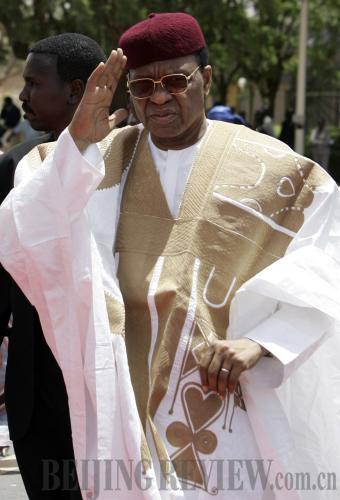|
 |
|
President Mamadou Tandja of Niger is kidnapped in Niamey on February 18 (XINHUA) |
Progress
In the past, in the aftermath of a coup, the military would traditionally assume power. But today, the situation is different. Although the problem of military interference in the political arena remains, it has become increasingly difficult to maintain military rule in Africa.
In most of the recent coups, for instance, civil society prevailed, after the military allowed for the restoration of constitutional order and the rule of law. Rather, it has become quite difficult to preserve long-term military governance.
Take Mauritania. After a military coup in 2008, a new government was formed through elections that were supervised by the international community.
In Guinea, after Captain Camara betrayed an earlier pledge not to run for the presidency, opposition members staged massive protests in 2009.
Despite his soldiers' brutal suppression of the demonstrators, Captain Camara would later formally agree to return Guinea to civilian rule.
In Niger, after the February coup, the army promised the international community that it would restore constitutional order and hold elections as soon as possible.
These developments have signified an encouraging change for Africa. On the one hand, thanks to the steady progress in democratization, African people have grown more resistant to authoritarian military regimes. On the other, Africa's internal supervision mechanisms have played a significant role.
In 2002, the African Union (AU) officially replaced the 39-year-old Organization of African Unity. Since then, it has carried out a series of reforms to enhance political stability throughout the continent. The collective security principles of Africa have since improved markedly from "non-intervention" to "non-indifference."
The AU has also established the Peace and Security Council as the decision-making and executive body for preventing, controlling and resolving conflicts in Africa. Its stated purpose is to promote peace, security and stability in Africa, while encouraging democratic practices, good governance and the rule of law.
These changes have, for the first time, enabled a regional African organization to legally intervene in domestic crises of its member states. They have also helped resolve long-standing disagreements over principles regarding collective intervention versus national sovereignty.
Moreover, African regional organizations - from the AU to the Economic Community of West African States and the Southern African Development Community - refuse to recognize military rule. Apart from suspending the membership of countries where coups have taken place, these organizations can also impose targeted sanctions against coup leaders and their supporters.
Life is now far more difficult for African military rulers these days. Hopefully this trend will, over time, help improve the political environment in Africa, thus enabling the continent to focus on more critical issues like economic development.
The author is an assistant research fellow with the Institute of West Asian and African Studies at the China Institutes of Contemporary International Relations |